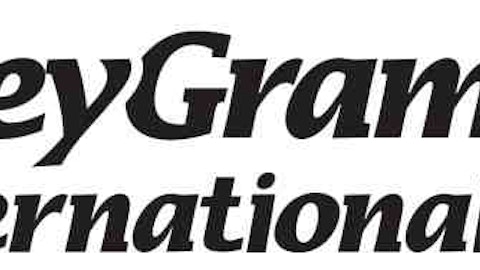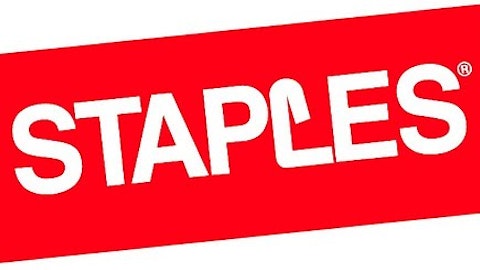Moneygram International Inc (NASDAQ:MGI) was up 5.35% on Friday as rumors swirled around Wall Street that a buyout of around $20-$27 could happen. That could represent a sharp premium from its $21.45 closing price as of Friday, but is a buyout likely?
Moneygram International Inc (NASDAQ:MGI) posted free cash flow (FCF) of $43.4 million last quarter, which was significantly better than the negative $90.3 million in FCF posted in the quarter before that, and much better than the negative $8.9 million in FCF it posted in the same quarter a year ago. Moneygram International Inc (NASDAQ:MGI) has also refinanced it debt, which will reduce interest costs and boost FCF going forward. Not to mention that many analysts, including those at Compass Point, think that Moneygram International Inc (NASDAQ:MGI) will start to be consistently profitable starting next year with a projected $120-125 million in FCF for 2014.
Who would want it
With all buyout rumors there needs to be a buyer for the rumor to start. In Moneygram International Inc (NASDAQ:MGI)’s case, they have several (according to the rumors). Euronet Worldwide, Inc. (NASDAQ:EEFT) tried to buy Moneygram International Inc (NASDAQ:MGI) in 2008 for $1.65 billion, but Moneygram fended off the offer because management didn’t want to sell. Keep in mind that the offer back then is 33% higher than where the stock is trading at right now. This is fertile ground for rumors because if someone tried to buy a company before and failed, they “could” try again.
There is also The Western Union Company (NYSE:WU), which is the largest provider of money transfers (Moneygram is the second largest) and offers similar services to Moneygram. Potentially The Western Union Company (NYSE:WU) could purchase Moneygram (assuming it could pass regulatory approval) and strengthen its stronghold in the money transfer realm, which is growing very rapidly in emerging markets.
Growth in money transfer services
Back in 2003 the money transfer services business totaled $207.6 billion. 5 years later in 2008 the size of the market had reached $418.6 billion, before dipping down to $394.4 billion as the global recession cut wages and raised unemployment levels. As of 2011 (latest data available) the market is back up to $479.25 billion and looks like it hit over $500 billion in 2012.
In 2 years the money transfer market grew by 21.5%, and if the trend continues then in 2012 the market should be worth $535 billion and by 2015 could be worth over $700 billion. This is explosive growth, and worth taking a look at as most companies operating in this market trade at low valuations.
Money transfer services are mostly used by foreign workers sending money home to their families or close relatives, so the stronger the global economy the more employed workers there are and the more money they make. This boosts Western Union, Euronet Worldwide, Inc. (NASDAQ:EEFT), and Moneygram’s top lines (and usually the bottom line) as more money is transferred back home, which means there is more money for them to take their small cut from.
Fundamentals
Moneygram saw its profit rise by 90% over the past 12 months, and that growth is expected to continue going forward. In the future analysts are expecting 13%-17% EPS growth as the strengthening global economy raises wages and employment and the money transfer market continues its rapid growth. Moneygram hasn’t been able to be consistently profitable yet since the recession, but that is expected to change in 2014. If Moneygram can be consistently profitable, even without being bought out, it would be a buy. It’s predicted forward PE is 14, but whether or not it can hit that target is up in the air.
Western Union has a PE (trailing 12 months) of 10 and is expected to grow its EPS at a 10%-12% rate over the next several years, which is in line with the growth of the overall money transfer market. Western Union has been consistently profitable and trades at a low valuation versus the market with a double digit growth rate, yet only a PE of 10. Not to mention that Western has a dividend yield of 3% with a low payout ratio of 27%, which means that Western could easily boost its dividend. I’m bullish on Western Union and think that they could either boost their dividend or buy out a smaller player.
Euronet Worldwide, Inc. (NASDAQ:EEFT) Worldwide has a ridiculously high PE of 81, but its forward PE is far more realistic at 13.9. With an expected EPS growth rate of 14%-15%, if it can hit its expected targets then this stock is fairly valued, or even slightly undervalued. Euronet Worldwide, Inc. (NASDAQ:EEFT) pays out no dividend, but with the industry growing quickly and profits normalizing one could be possible in the future.
Rational thinking and final thoughts
Always be cautious when a buyout rumor is in the air. If Moneygram is bought out for $25 a share then you would be a happy investor with a quick 25% return, but if the rumor turns out to be false the shares will fall and you will be sitting on a large loss. I would wait until the rumor pans out and only invest (with a small options play or speculative stake) in them if the rumor has more substantial evidence or if they aren’t bought out and trade at a lower level.
Out of these 3 companies Western Union is by far the best bet, as they are consistently profitable, the biggest player in the market, trade at the lowest valuation, pay out a nice 3% dividend and could boost that yield in the future. The market Western Union operates in is growing fast and has a lot of exposure to emerging markets with high growth rates. Be bullish on Western Union.
The article Profiting from Wall Street Rumors originally appeared on Fool.com.
Callum Turcan has no position in any stocks mentioned. The Motley Fool recommends Western Union. Callum is a member of The Motley Fool Blog Network — entries represent the personal opinion of the blogger and are not formally edited.
Copyright © 1995 – 2013 The Motley Fool, LLC. All rights reserved. The Motley Fool has a disclosure policy.






